 Petzlover
Petzlover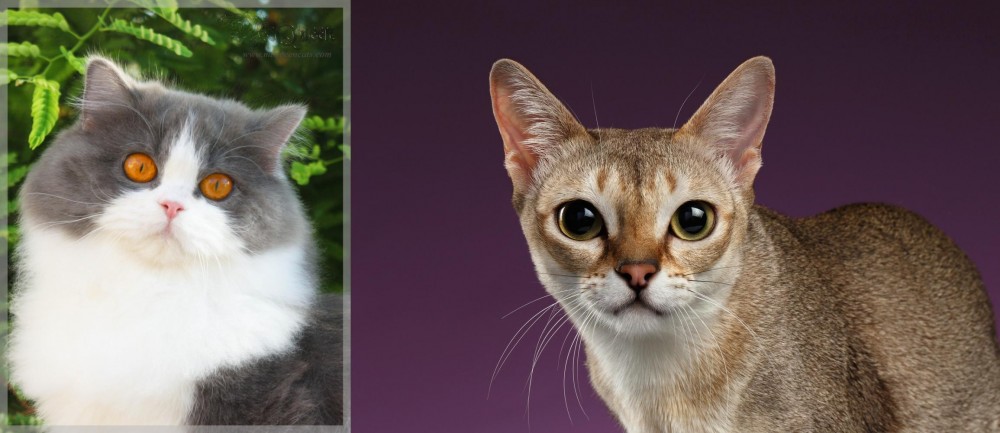 British Longhair is originated from United Kingdom but Singapura is originated from Singapore. Both British Longhair and Singapura are having almost same weight. Both British Longhair and Singapura has same life span. Both British Longhair and Singapura has almost same litter size. British Longhair requires Moderate Maintenance. But Singapura requires Low Maintenance
British Longhair is originated from United Kingdom but Singapura is originated from Singapore. Both British Longhair and Singapura are having almost same weight. Both British Longhair and Singapura has same life span. Both British Longhair and Singapura has almost same litter size. British Longhair requires Moderate Maintenance. But Singapura requires Low Maintenance
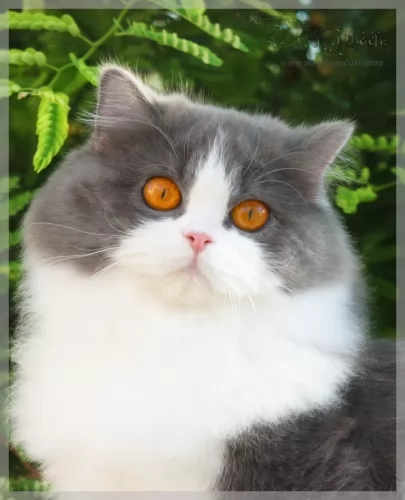 The British Longhair cat hails from Great Britain. The cat is a longer-haired variety of the British Shorthair.
The British Longhair cat hails from Great Britain. The cat is a longer-haired variety of the British Shorthair.
These British Shorthairs were interbred with imported long-haired varieties with the idea being to bring about a cat that was more compact and stout and with a rounder face. Today the British Longhair is an established longhair breed in its own right.
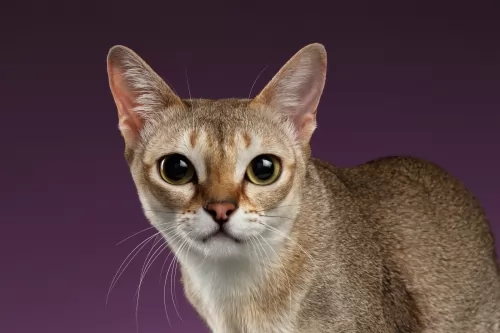 There are conflicting stories surrounding the origination of the Singapura. It does seem however, that natural Singapurans were found in Singapore.
There are conflicting stories surrounding the origination of the Singapura. It does seem however, that natural Singapurans were found in Singapore.
The first documented account was of a cat known as Chiko who was found in a Singaporean SPCA in 1980 by Sheila Bowers and WA Brad.
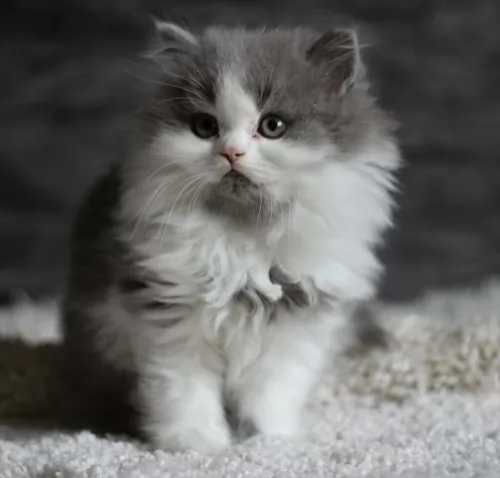 The beautiful British Longhair cat is a medium-sized feline, leaning towards being a large cat with semi-long hair.
The beautiful British Longhair cat is a medium-sized feline, leaning towards being a large cat with semi-long hair.
The cat, whether males or females can weigh between 4 and 8kg. It is robust and muscular with round paws and legs of medium length. The ears are smallish and round at the tips.
The color of the eyes can be different - browns, greens, blue, and grey. The colors of the coat can be blue, white, black, grey, calico, tabby, bi-color and tortoiseshell. The coat can be a solid color or it can be in different patterns. The fur is always medium length and silky with an undercoat.
The British Longhair has much the same personality as the British Shorthair – being calm, amicable cats who appreciate their human owners.
They’re adaptable cats too and are willing to get along with any other pets in the home as well. They’re playful and affectionate with their owners but don’t particularly like being held for too long.
Even though this is a docile cate, it is intelligent and will require mental stimulation. You’ll need to invest in a few ‘intelligent’ type of toys to keep your cat physically and mentally active. Take a look at the kinds of games where your cat will be required to ‘hunt’ for his food.
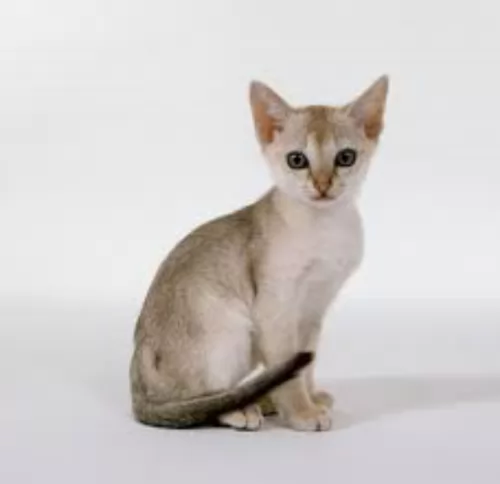 The Singapura cat is small in size, not weighing more than 2, 3 or 4kg. This short-haired, ivory-colored coat has brown ticking.
The Singapura cat is small in size, not weighing more than 2, 3 or 4kg. This short-haired, ivory-colored coat has brown ticking.
The cat is a natural breed and is muscular and strong. It is actually the smallest of the domestic cats. The cat has big ears, large green or yellowish eyes and is often referred to as ‘Pura’.
While the Singapura looks like a small, finely boned cat, when you pick him up, you discover that he is actually deceivingly heavy. The cat has slender legs with the back legs being slightly longer than the front legs. The tail ends with a recognizable black tip.
The Pura is intelligent and inquisitive and loves leaping onto high surfaces to explore. They then love to come bounding down and to land in one of his family member’s laps. This cat is a bundle of energy and playfulness. You'll need to invest in toys for your fun-loving Pura who loves nothing more than to be playing with soft little balls or scampering after a toy-mouse.
He is social and extroverted and gets along well with children and dogs in the house. He isn’t as vocal as some of the other cat breeds and actually has a quiet voice. The Singapura cat personality is outgoing, active and inquisitive and full of tricks and he is always ready to join in with any games.
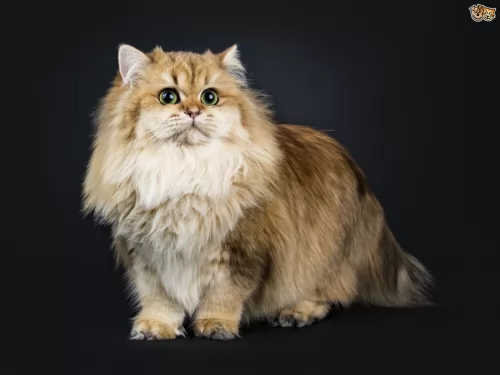 The British Longhair makes an awesome pet and can live happily with children, other dogs, and cats and all of his human family.
The British Longhair makes an awesome pet and can live happily with children, other dogs, and cats and all of his human family.
He isn’t a cat that wants to be picked up too often – he is independent but is willing and loving towards his humans.
For the friendship he offers, you’ll want to reward him for the joy he brings by providing well for him.
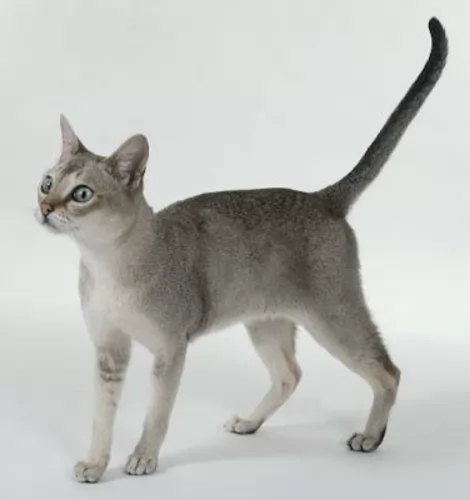 Singapuras make awesome pets and with all their energy and antics they provide hours of entertainment. They are intelligent, energetic, and playful. The people who have them say they become your best friend because they are cats that are sensitive to the moods of their human owners.
Singapuras make awesome pets and with all their energy and antics they provide hours of entertainment. They are intelligent, energetic, and playful. The people who have them say they become your best friend because they are cats that are sensitive to the moods of their human owners.
Dynamite comes in small packages, and that’s exactly what you get when you bring the small Singapura cat into your home and life.
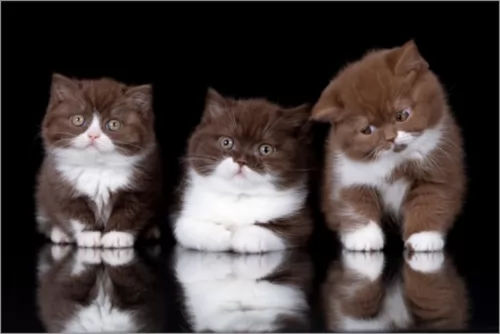 These beautiful cats can be prone to obesity if kept as an indoor cat only and a cat that doesn't get enough exercise.
These beautiful cats can be prone to obesity if kept as an indoor cat only and a cat that doesn't get enough exercise.
Obesity, an accumulation of excess body weight, is a preventable disease. It is necessary to prevent this obesity as it can reduce your pet’s life expectancy. Fat tissue is active, secreting inflammatory hormones and creating oxidative stress on the body’s tissue, and this is precisely what contributes to so many diseases.
The British Longhair cat can also be prone to renal polycystosis. This disease is where many pockets of fluid or cysts form in the kidney and if they grow large over time they can actually interfere with kidney function and this can bring on kidney failure.
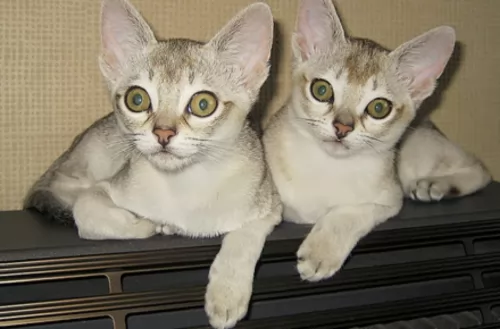 Your sweet Singapura cat has no particular genetic problems to deal with and also no specific health concerns. Although he is a generally healthy cat, one health condition that you want to be aware of is uterine inertia with the females.
Your sweet Singapura cat has no particular genetic problems to deal with and also no specific health concerns. Although he is a generally healthy cat, one health condition that you want to be aware of is uterine inertia with the females.
This particular condition was found in one of the foundation cats and still appears in some Singapura females.
Look after him well and return his love, and health issues will remain low. Having said that, every cat breed can develop health problems, and it pays to understand some of the more common cat illnesses.
Feline Lower Urinary Tract Disease is something that both male- and female cats can get. Watch that your Singapura doesn’t become overweight or unfit because this disease often occurs in cats who have become overweight.
Stress with a cat can also bring about this most uncomfortable disease in your cat. You’ll see your cat straining to urinate, he cries when urinating, and he isn’t his usual chirpy self. He may even have bloody urine. Get your pet to the vet immediately as not being able to urinate is an emergency.
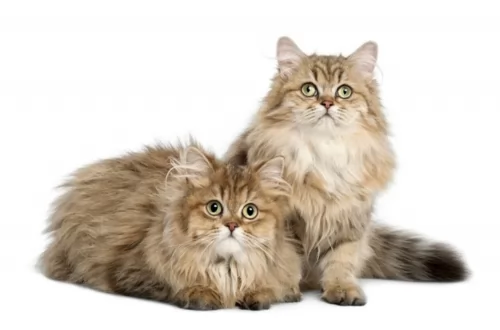 Because of the long hair, the British Longhair is going to require brushing as the coat can easily become matted, particularly as the coat thickens in preparation for winter.
Because of the long hair, the British Longhair is going to require brushing as the coat can easily become matted, particularly as the coat thickens in preparation for winter.
You’ll need to brush the hair once a week, but perhaps more in peak shedding times. A gentle but firm brushing keeps the cat’s fur and skin in good condition.
Have your pet spayed and neutered to avoid unwanted kittens.
Take your pet to the vet as soon as he is unwell. He is part of your family now and must be treated as such.
Provide your pet with human companionship especially if you buy one of the more social cats.
If your cat is an indoor pet, provide him with a litter box ad be prepared to clean it every day.
Provide a clean, dry, comfortable bed in a quiet area.
Provide your cat with stimulating toys.
Vaccinate your cat against the major feline diseases. Also, have your cat dewormed.
In terms of nutritional requirements, make sure that your British Longhair gets the very best cat food there is, whether you provide him with homemade food or you give him some of the excellent commercially manufactured cat foods there are.
There are wet- and dry foods and it's for your furry friend to decide which one he prefers.
Learn to read labels and make sure your cat is getting foods high in protein, after all, your cat is a carnivore.
Be sure that the food has lots of vitamins and minerals for his health. A cat also needs a constant supply of fresh, cool water.
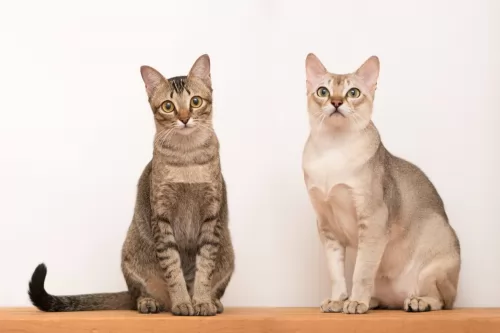 Your Singapura cat’s short coat is easy to groom. Brush your pet every week to remove the loose hairs and to also keep the coat sleek and shiny.
Your Singapura cat’s short coat is easy to groom. Brush your pet every week to remove the loose hairs and to also keep the coat sleek and shiny.
Every cat is a carnivore. Singapuras need meat if you want to avoid your cat getting some of the cat health problems there are. Singapura’s digestive system isn’t designed for foods that humans eat.
He will need high-quality food to ensure his ongoing good health. If you are going to feed your Singapura commercially packaged foods, take a good look at the ingredient list and make sure that meat and protein is at the top of the list.
Always buy age-appropriate food. You can imagine that a tiny kitten’s food requirements will be very different to that of an adult cat.
A kitten will require at least 3 or 4 meals a day. It is always a good idea to consult your vet for suggestions on what brand- and type of food to give your kitten and your adult Singapura.